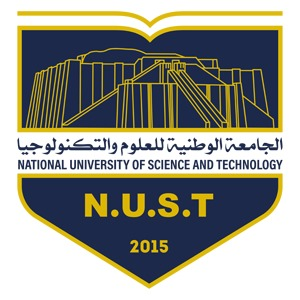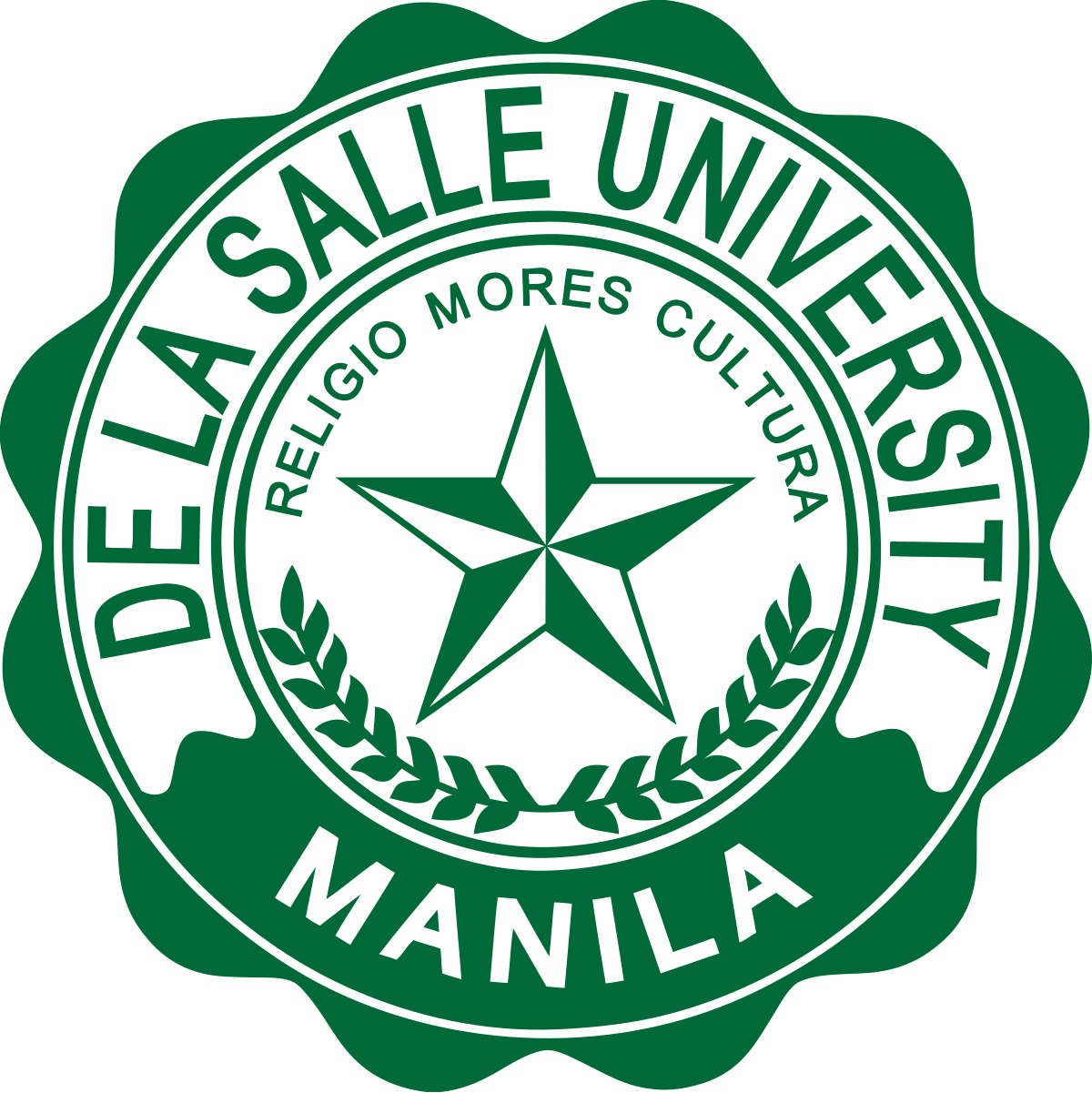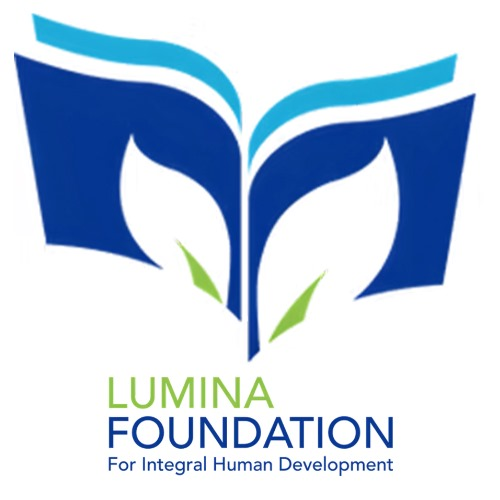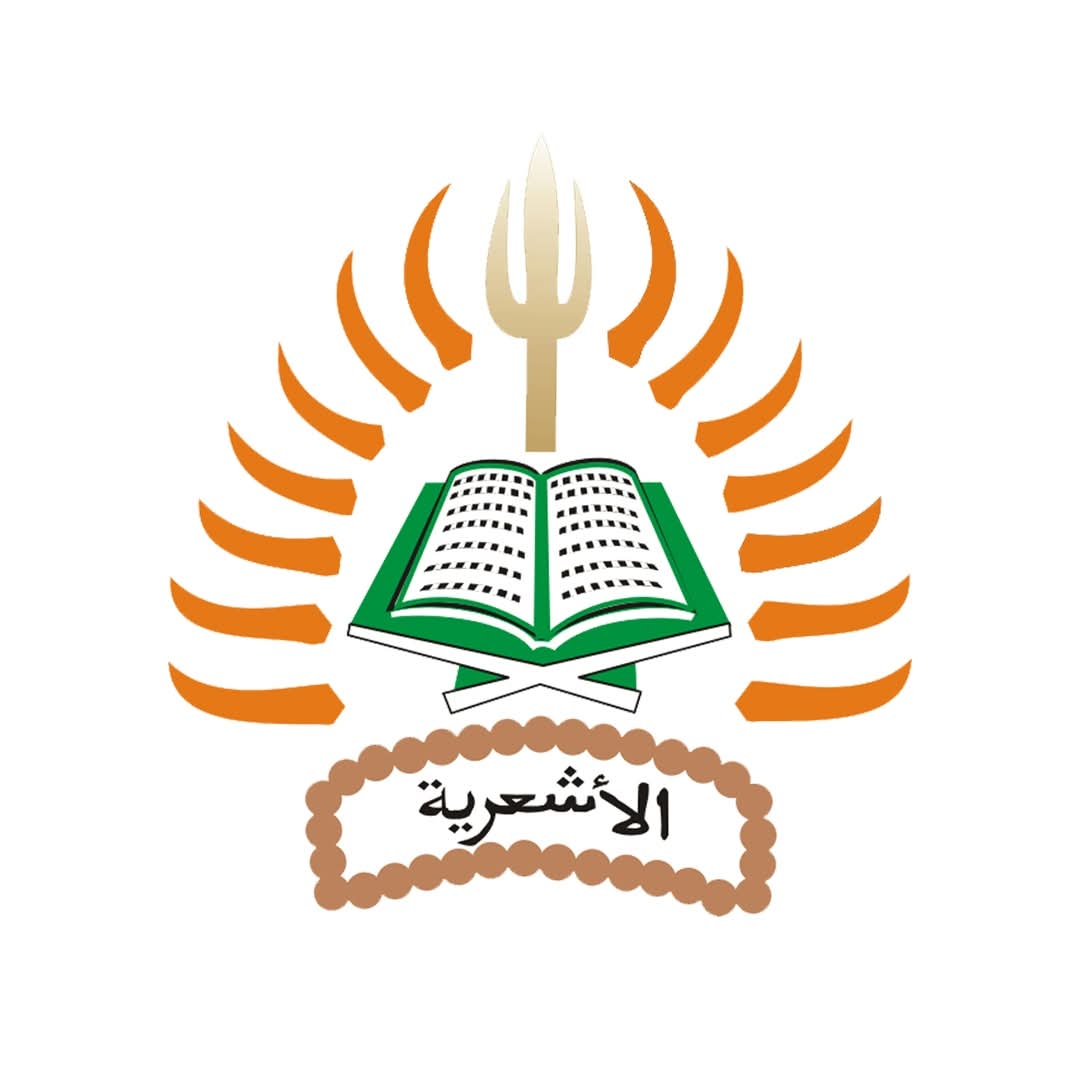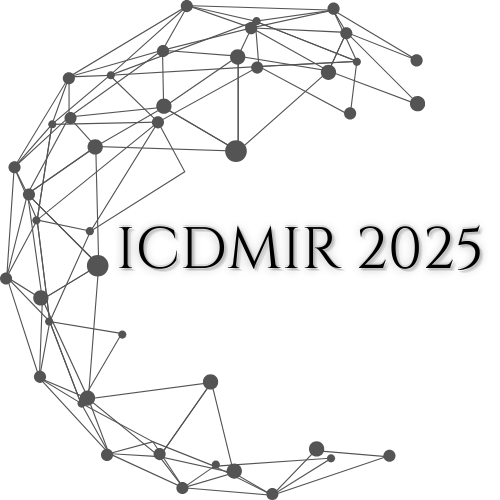
About The Conference
Teams - Link
About the Conference
The International Conference on Data Management and Information Retrieval (ICDMIR) is a global platform dedicated to advancing research and innovation in data management, information retrieval, and related fields. The conference aims to bring together researchers, industry professionals, and academics to share cutting-edge developments in areas such as machine learning, deep learning, data analytics, natural language processing, big data, and information security.
By fostering collaboration and knowledge exchange, ICDMIR seeks to address real-world challenges, explore emerging trends like explainable AI and reinforcement learning, and promote interdisciplinary research. The event highlights practical applications in domains such as healthcare, e-commerce, bioinformatics, and disaster management, while encouraging discussions on scalability, security, and real-time data processing.
Through keynote speeches, paper presentations, and workshops, ICDMIR aims to inspire innovation and drive the future of data-driven technologies.
Conference Caution
ICDMIR welcomes submissions of full-length papers, special sessions, and workshop proposals based on the following groups: Lecturers, researchers, students, and foreigners.
Important Dates
- Applications for participation deadline: 10.10.2025r.
- First paper submission deadline: 10.10.2025r.
- Second paper submission deadline: 01.11.2025r.
- Agenda publication: 30.10.2025r.
- Conference: 7.11.2025r.
Moderator of the conference: Beata Szymańska-Waczyńska
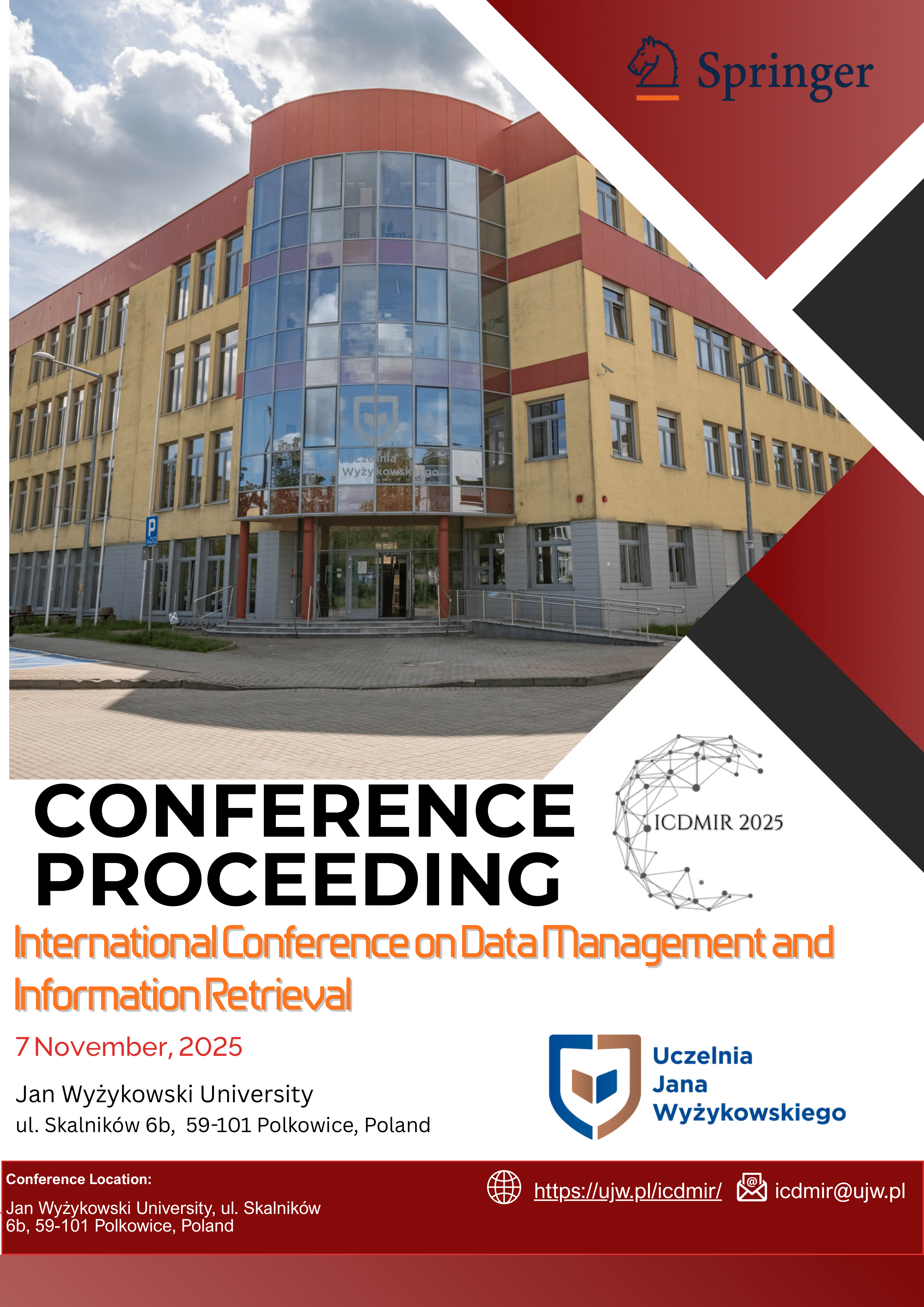
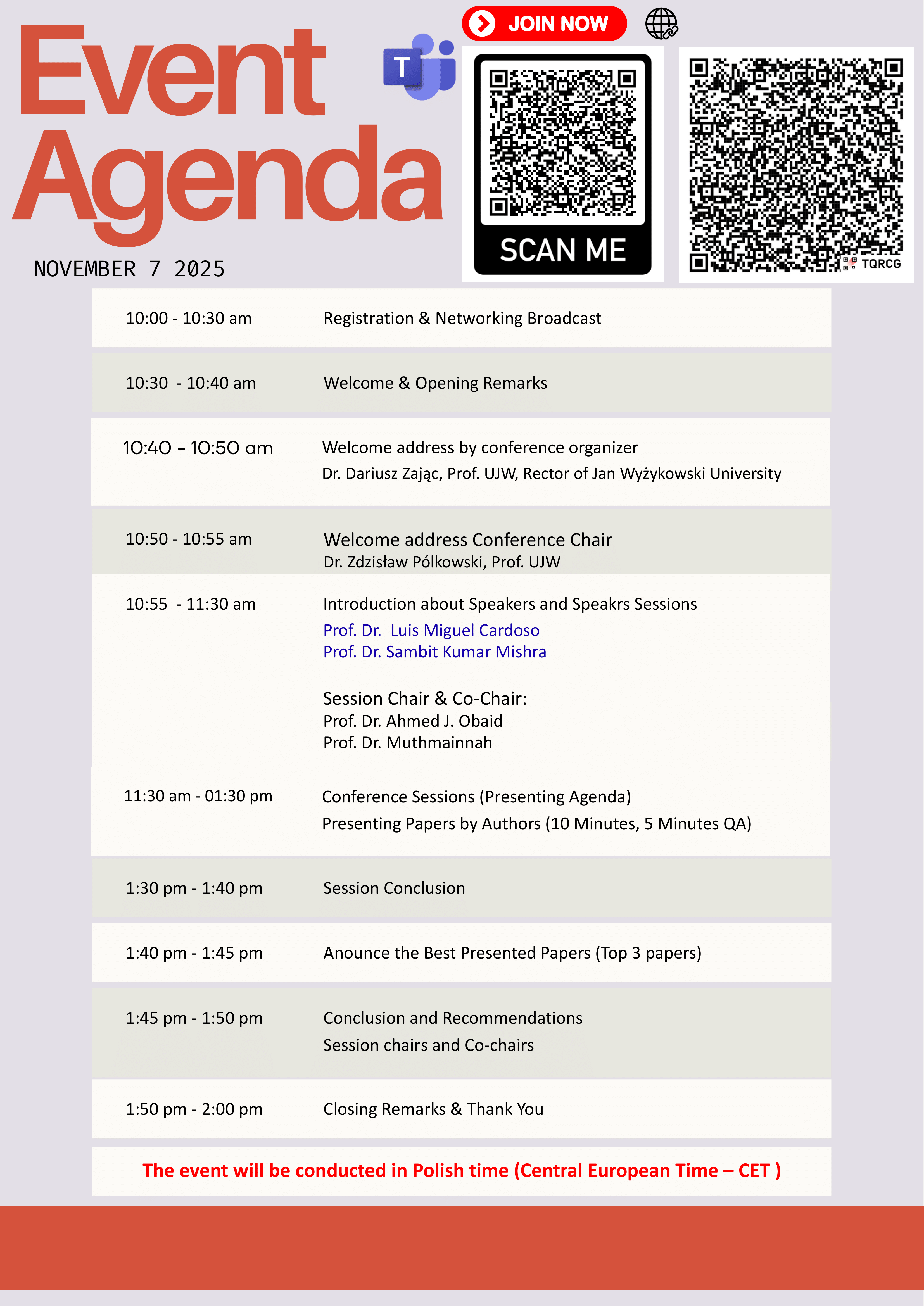
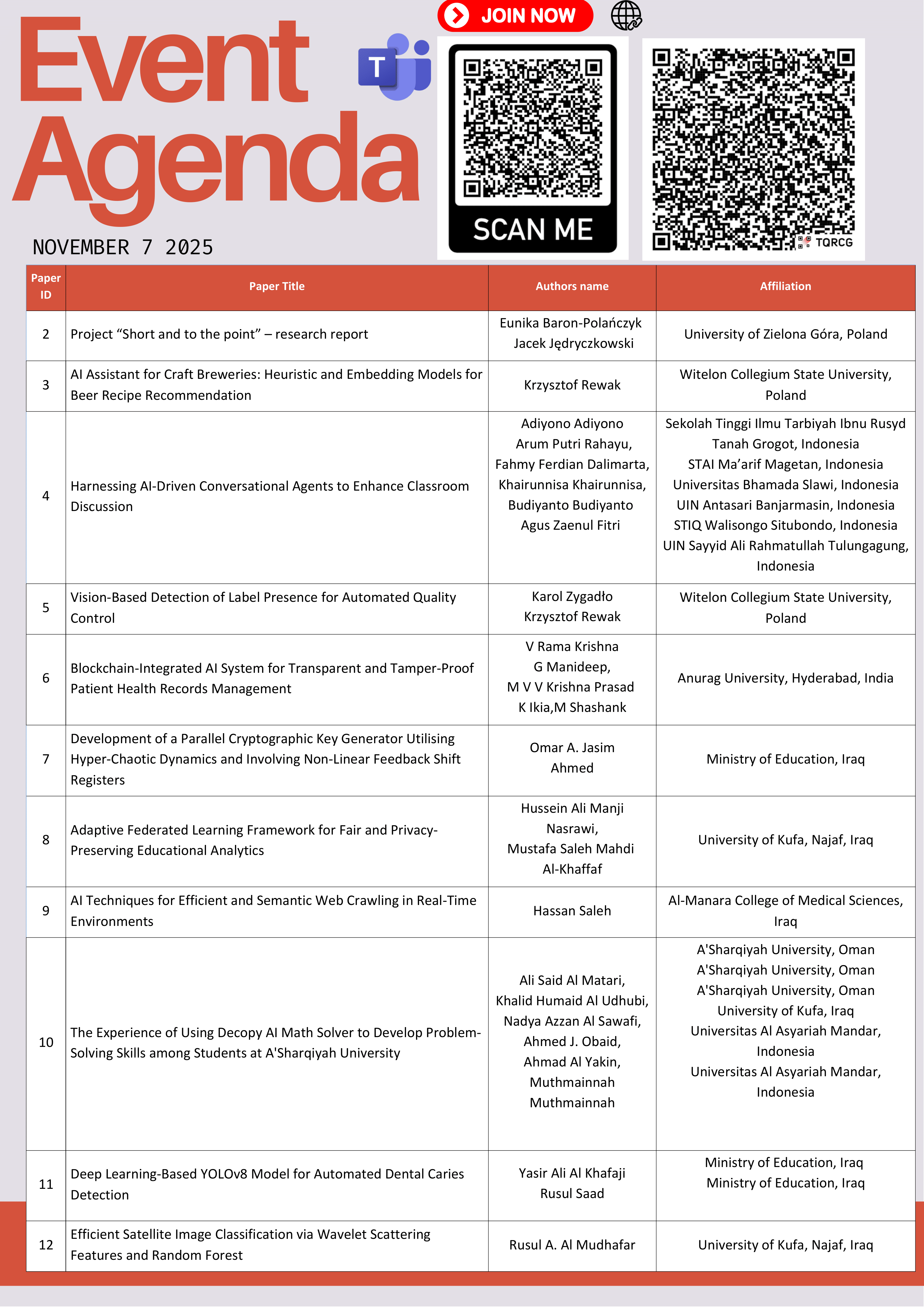
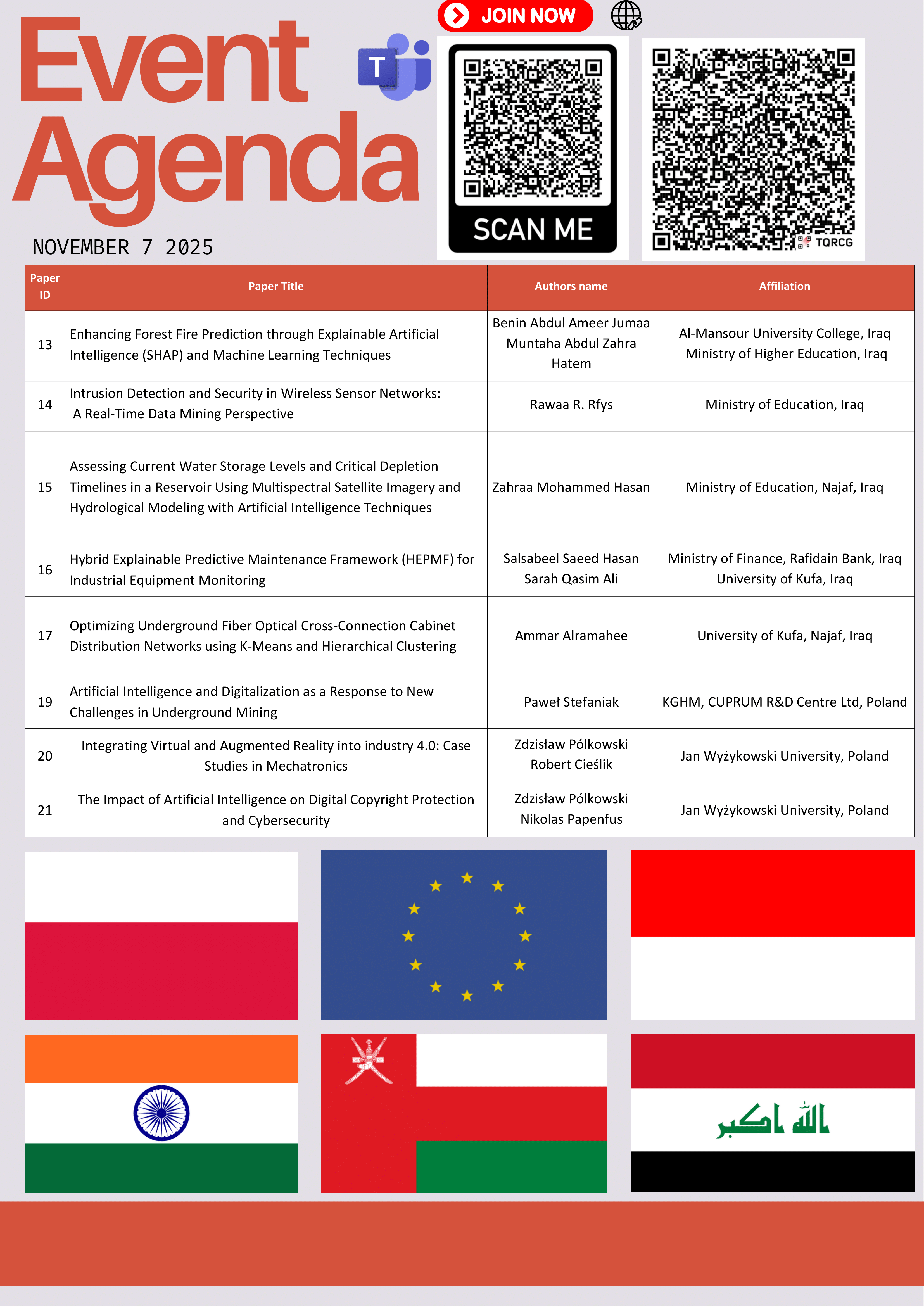

Conference Topics
| Computational Intelligence | Information Retrieval |
|---|---|
| Neural Networks and Deep Learning | Deep Learning |
| Evolutionary Computation | Internet of Thing |
| Fuzzy Systems | Bioinformatics |
| Machine Learning | Medical Informatics |
| Natural Language Processing | Stochastic Optimization |
| Computer Vision and Pattern Recognition | Information and Network Security |
| Bioinformatics and Biocomputing | Ecommerce and Digital Marketing |
| Bioinformatics and Biocomputing | Internet and Web Technologies |
| Optimization Techniques | Knowledge discovery in Database |
| Applications and Real-world Systems | Recommendation systems |
| Data Science and Data Analytics | Data Analytics and Data Mining |
|---|---|
| Data Science Techniques and Applications | Scalable Data Processing Architectures |
| Big Data Analytic | Machine Learning and Deep Learning Innovations |
| Data Warehousing and Data Mining | Extracting Insights from Massive Datasets |
| Disaster Management | Real-Time Data Mining Techniques |
| Social Network Analysis | Predictive Analytics for Business Intelligence |
| Text, Audio and Video data Analysis | Data Preprocessing and Feature Engineering |
| Motion Planning | Advanced Architectures for Neural Networks |
| Decision-making | Transfer Learning and Its Applications |
| Data mining in Dynamic Environment | Reinforcement Learning for Complex Systems |
| Hybrid Computing | Explainable AI: Techniques and Challenges |

Conference Organizers

About Organizers
Jan Wyżykowski University
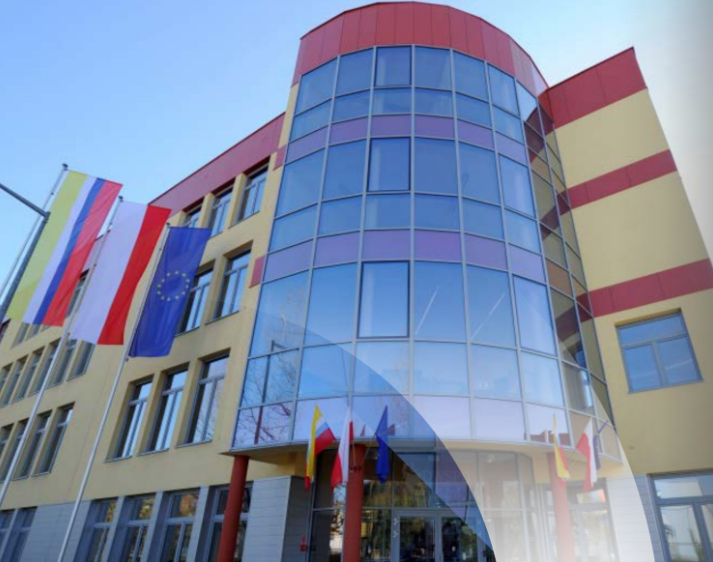

Jan Wyżykowski University (UJW) was created as a result of the consolidation of Uczelnia Zawodowa Zagłębia Miedziowego and Dolnośląska Wyższa Szkoła Przedsiębiorczości i Techniki (The Lower Silesian University of Entrepreneurship and Technology). Both schools had functioned separately in 2002–2015 to join their efforts in 2016. At present UJW is the only independent, local-government based school of higher education in Poland. Its head office is in Polkowice and its branch is in Lubin, 20 km from Polkowice.

Speakers
Keynote Speakers
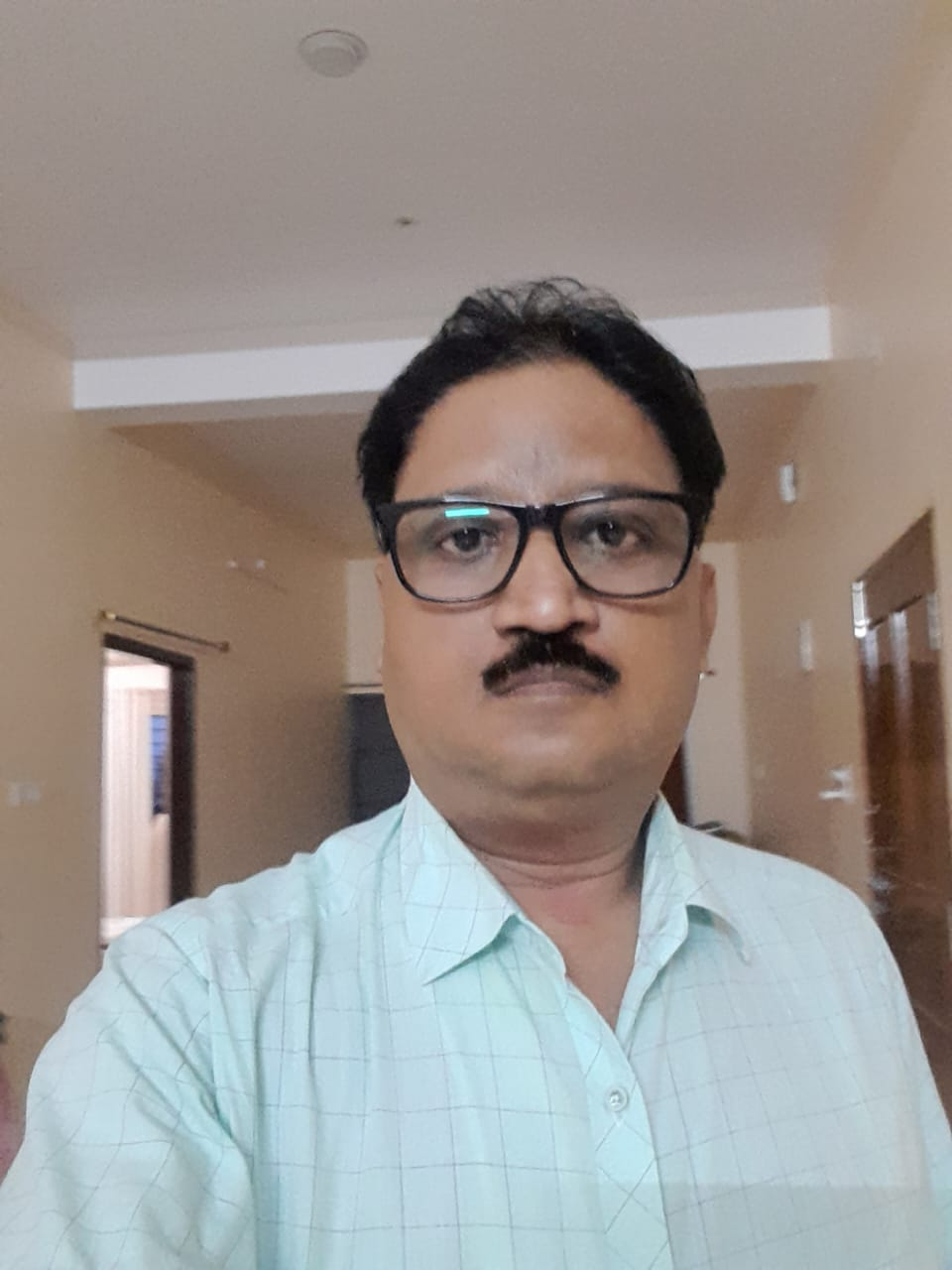
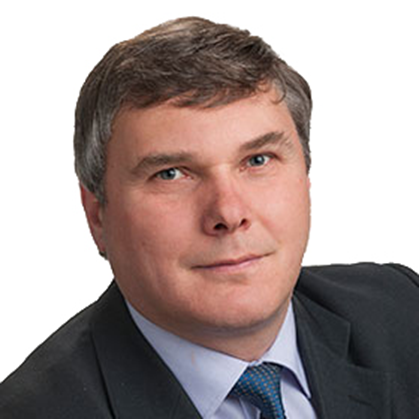
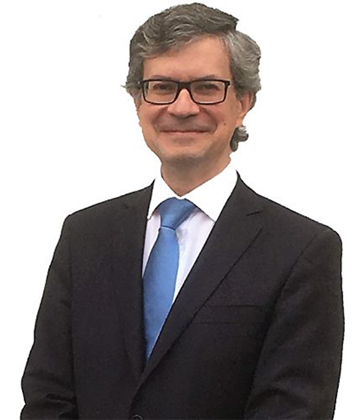
Committees
Honorary Chair
| No | Full Name | Affiliation | Country |
|---|---|---|---|
| 1 | Dr. Dariusz Zając, Prof. UJW | Rector, Jan Wyżykowski University | Poland |
| 2 | Dr. Rafał Czachor, Prof. UJW | Dean of the Faculty of Social and Technical Sciences, Jan Wyżykowski University | Poland |
| 3 | Dr. Piotr Krysiak | Vice-Dean of the Faculty of Social and Technical Sciences, Jan Wyżykowski University | Poland |
General Chair
| No | Full Name | Affiliation | Country |
|---|---|---|---|
| 1 | Dr. Zdzisław Półkowski, Prof. UJW | Jan Wyżykowski University | Poland |
| 2 | Prof. Dr. Ahmed J. Obaid | University of Kufa | Iraq |
| 3 | Prof. Dr. Muthmainnah | Universitas Al Asy'ariah Mandar | Indonesia |
| 4 | Prof. Valentina E. Balas | Faculty of Engineering, University of Arad | Romania |
Program Chair
| No | Full Name | Affiliation | Country |
|---|---|---|---|
| 1 | Prof. Dr. Fides del Castillo | De La Salle University | Philippines |
| 2 | Dr. Alex Khang | Global Research Institute of Technology and Engineering, North Carolina | USA |
| 3 | Dr. Ali Said Al-Matari | A'Sharqiyah University | Oman |
| 4 | Dr. Muhammad Mujtaba Asad | Department of Education, Sukkur IBA University Sukkur, Pakistan | Pakistan |
| 5 | Dr. Haitham Alzoubi | School of Business, Skyline University College UAE | UAE |
| 6 | Dr. Parul Agarwal | Jamia Hamdard University, New Delhi, India | India |
| 7 | Dr. Bharat Bhushan | School of Engineering and Technology, Sharda University, India. | India |
| 8 | Prof. Dr. Dmitry Kachan | Department 6 – Electrical, Mechanical and Industrial Engineering, Anhalt University of Applied Sciences. | Germany |
Financial Committee
| No | Full Name | Affiliation | Country |
|---|---|---|---|
| 1 | Dr. Włodzimierz Olszewski, Prof. UJW | Jan Wyżykowski University | Poland |
| 2 | Dr. Zdzisław Pólkowski, Prof. UJW | Jan Wyżykowski University | Poland |
| 3 | Prof. Ahmed J. Obaid | University of Kufa | Iraq |
Steering Committee
| No | Full Name | Affiliation | Country |
|---|---|---|---|
| 1 | Dr. Muhammad Mujtaba Asad | Department of Education, Sukkur IBA University Sukkur, Pakistan | Pakistan |
| 2 | Dr. Rhonnel S. Paculanan | Arellano University – Pasig | Philippine |
| 3 | Dr. Shafiq Ur Rehman | University of Doha Science and Technology - Qatar | Qatar |
| 4 | Dr. Carmen Sonia Duse | Professor Lucian Blaga University of Sibiu, Romania | Romania |
| 5 | Dr. Seiko Harumi | Victoria University, Australia | Australia |
| 6 | Dr. Gwo-Jen Hwang | National Taiwan University of Science and Technology, Taiwan | Taiwan |
| 7 | Dr. Monica Karlsson | Halmstad University, Sweden | Sweden |
| 8 | Dr. Dilani Gedera | Auckland University of Technology, New Zealand | New Zealand |
| 9 | Dr. Ivana Cirkovic-Miladinovic | University of Kragujevac, Serbia | Serbia |
| 10 | Dr. Adrian Rodgers | Ohio State University, United States | USA |
| 11 | Dr. Parul Agarwal | Jamia Hamdard University, New Delhi, India | India |
| 12 | Dr. Sobirov Bobur | Samarkand Institute of Economics and Service, Uzbekistan | Uzbekistan |
Technical Program Committee
| No | Full Name | Affiliation | Country |
|---|---|---|---|
| 1 | Prof. Ahmed J. Obaid | University of Kufa | Iraq |
| 2 | Dr. Zdzisław Pólkowski, Prof. UJW | Jan Wyżykowski University | Poland |
| 3 | Prof. Dr. Alex Khang | Institute of Technology and Engineering | Vietnam |
| 4 | Dr. Muthmainnah | Universitas Al Asy'ariah Mandar | Indonesia |
| 5 | Prof. Dr. Luis Miguel Cardoso | University of Coimbra | Portugal |
| 6 | Prof. Dr. Michael Baron | Analytics Institute of Australia | Australia |
Scientific Committee
| No | Full Name | Affiliation | Country |
|---|---|---|---|
| 1 | Dr. Zdzisław Półkowski, Prof. UJW | Jan Wyżykowski University | Poland |
| 2 | Prof. Dr. Ahmed J. Obaid | University of Kufa | Iraq |
| 3 | Prof. Dr. Muthmainnah | Universitas Al Asy'ariah Mandar | Indonesia |
| 4 | Prof. Dr. Adriana Schiopoiu | University of Craiova | Romania |
| 5 | Dr. Lázaro Rodríguez | universidad de Granada | Spain |
| 6 | Dr. Mzili Toufik | Chouaib Doukkali University | Morocco |
| 7 | Prof. Dr. Sherif Mohamed Ismail | University of Cairo | Egypt |
| 8 | Dr. Samantha Curle | University of Bath | UK |
| 9 | Dr. Dither Balderas | México University | México |
| 10 | Dr. Muhammad Mohsin Waqas | Khwaja Fareed University | Pakistan |
| 11 | Prof. Dr. Christoph Rasche | University of Potsdam | Germany |
| 12 | Dr. Van Thanh Tien Nguyen | University of Science and Technology | Tai |
| 13 | Dr. Nasser A. Saeed | Department of Physics and Engineering Mathematics, Faculty of Electronic Engineering, Menoufia University, Menouf | Egypt |
| 14 | Dr. Faruk Ozger | Igder University | Turkey |
| 15 | Dr. Veit-Thanh Pham | Faculty of Electronics Technology, Industrial University of Ho Chi Minh City, Ho Chi Minh City | Vietnam |
| 16 | Dr. Ejdane Coşkun | Osmaniye Korkut Ata University | Turkey |
| 17 | Dr. Göksel Coşkun | Osmaniye Korkut Ata University | Turkey |
Organizing Committee
| No | Full Name | Affiliation | Country |
|---|---|---|---|
| 1 | Director Edyta Zarecka | Jan Wyżykowski University | Poland |
| 2 | Vice director Ewa Zięcina | Jan Wyżykowski University | Poland |
| 3 | Marta Ambroziak-Sieradzka | Jan Wyżykowski University | Poland |
| 4 | Małgorzata Sekuła | Jan Wyżykowski University | Poland |
| 5 | Paweł Zimkowski | Jan Wyżykowski University | Poland |
| 6 | Dr. Włodzimierz Olszewski, Prof. UJW | Jan Wyżykowski University | Poland |
Publicity Committee
| No | Full Name | Affiliation | Country |
|---|---|---|---|
| 1 | Prof. Dr. Adriana Schiopoiu | University of Craiova | Romania |
| 2 | Prof. Dr. Ryo Takahashi | American University of Sovereign Nations | Japan |
| 3 | Dr. Shashi Kant Gupta | Chinmay Research Education and Publication Private | India |
| 4 | Dr. Subrata Chowdhury | SITAMS (A) Chittoor AP, India | India |
| 5 | Dr. Vasileios Drougas | Ministry of Education and Religious Affairs | Greek |
| 6 | Prof. Dr. Mohammad Israr | Maryam Abacha, American University of Nigeria | Nigeria |

Conference Venue
Jan Wyżykowski University
Address: ul. Skalników 6b
59-101 Polkowice, Poland
The conference will be held at Jan Wyżykowski University in Polkowice, a modern academic center located in southwestern Poland. The venue offers state-of-the-art facilities for academic presentations and networking.

How to Reach Polkowice
✈️ From Wrocław Airport (WRO)
- By Car: ~90 min via S3 expressway
- By Bus: FlixBus or PKS connections (Wrocław → Lubin → Polkowice)
- By Train: Wrocław → Lubin + local bus to Polkowice
✈️ From Warsaw Chopin Airport (WAW)
- By Plane: Optional flight to Wrocław (then follow route above)
- By Train: Warsaw → Wrocław → Lubin + bus
- By Car: ~4.5 h via A2 and S3
✈️ From Berlin Brandenburg Airport (BER)
- By Car: ~4 h via A15 and A18
- By Train: Berlin → Wrocław → Lubin + bus
- By Bus: Berlin → Polkowice (some direct FlixBus lines)
✈️ From Prague Airport (PRG)
- By Car: ~3.5 h via D11 and DK12
- By Train: Prague → Wrocław → Lubin + bus
- By Bus: Prague → Polkowice (possible changes in Wrocław)
📍 Conference Location
Jan Wyżykowski University, ul. Skalników 6b, 59-101 Polkowice, Poland

Contact
Prof. Dr. Zdzisław Pólkowski
Email: polkowski@ujw.pl
Phone: +48 512 084 372
Affiliation:
Jan Wyżykowski University
Polkowice, Poland
Prof. Dr. Włodzimierz Olszewski
Email: w.olszewski@ujw.pl
Phone: +48 76 746 53 49, +48 600 859 599
Affiliation:
Jan Wyżykowski University
Polkowice, Poland
Prof. Dr. Ahmed J. Obaid
Email: ahmedj.aljanaby@uokufa.edu.iq
Phone: +964 780268 6683
Affiliation:
Associated Professor at University of Kufa
Iraq

Conference Proceeding
The International Conference on Data Management and Information Retrieval (ICDMIR) is a global platform dedicated to advancing research and innovation in data management, information retrieval, and related fields. The conference aims to bring together researchers, industry professionals, and academics to share cutting-edge developments in areas such as machine learning, deep learning, data analytics, natural language processing, big data, and information security.
All accepted and registered full papers must be presented at the conference. The proceedings of ICDMIR 2025 will be published as a Conference Paper in STEAM-H Springer Series ISSN : ISSN: 2520-193X; E-ISSN:2520-1948, (Scopus-Indexed Springer Series), and other databased Mathematical Reviews, and zbMATH.
Conference Publication
All Accepted and Registered full papers must be presented at the conference. The proceedings of ICDMIR 2025 will be published as Conference Paper in STEAM-H Springer Series ISSN : ISSN: 2520-193X; E-ISSN:2520-1948, (Scopus-Indexed Springer Series), and other databased Mathematical Reviews, and zbMATH.
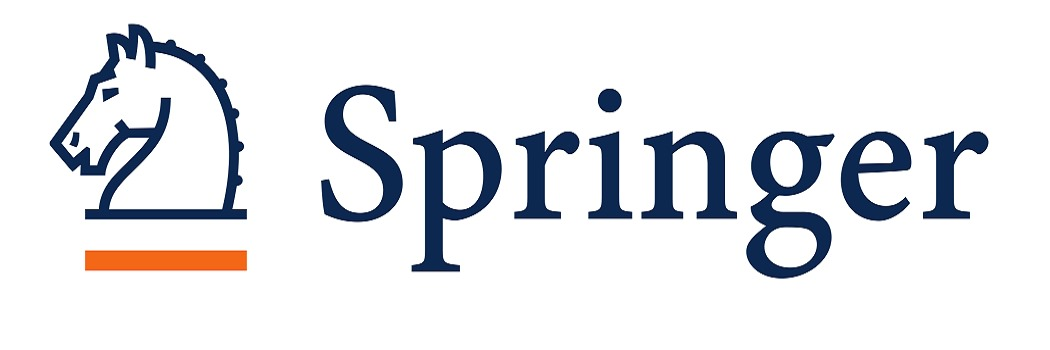
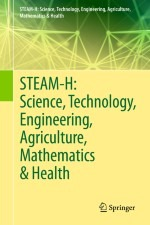
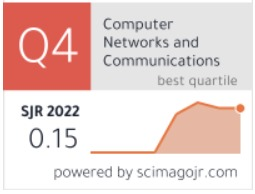
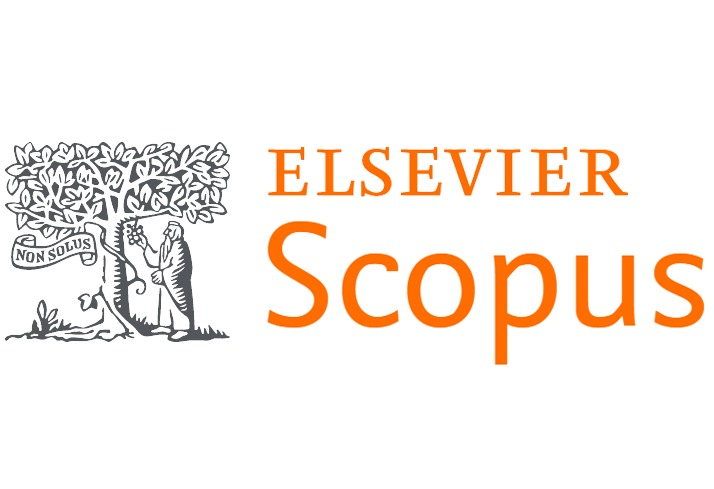
Submit Your Paper Now
The Microsoft CMT service was used for managing the peer-reviewing process for this conference. This service was provided for free by Microsoft and they bore all expenses, including costs for Azure cloud services as well as for software development and support.
Submit Paper
Authors Guidelines

About The Conference
Teams - Link
About the Conference
The International Conference on Data Management and Information Retrieval (ICDMIR) is a global platform dedicated to advancing research and innovation in data management, information retrieval, and related fields. The conference aims to bring together researchers, industry professionals, and academics to share cutting-edge developments in areas such as machine learning, deep learning, data analytics, natural language processing, big data, and information security.
By fostering collaboration and knowledge exchange, ICDMIR seeks to address real-world challenges, explore emerging trends like explainable AI and reinforcement learning, and promote interdisciplinary research. The event highlights practical applications in domains such as healthcare, e-commerce, bioinformatics, and disaster management, while encouraging discussions on scalability, security, and real-time data processing.
Through keynote speeches, paper presentations, and workshops, ICDMIR aims to inspire innovation and drive the future of data-driven technologies.
Conference Caution
ICDMIR welcomes submissions of full-length papers, special sessions, and workshop proposals based on the following groups: Lecturers, researchers, students, and foreigners.
Important Dates
- Applications for participation deadline: 10.10.2025r.
- First paper submission deadline: 10.10.2025r.
- Second paper submission deadline: 01.11.2025r.
- Agenda publication: 30.10.2025r.
- Conference: 7.11.2025r.
Moderator of the conference: Beata Szymańska-Waczyńska





Conference Topics
| Computational Intelligence | Information Retrieval |
|---|---|
| Neural Networks and Deep Learning | Deep Learning |
| Evolutionary Computation | Internet of Thing |
| Fuzzy Systems | Bioinformatics |
| Machine Learning | Medical Informatics |
| Natural Language Processing | Stochastic Optimization |
| Computer Vision and Pattern Recognition | Information and Network Security |
| Bioinformatics and Biocomputing | Ecommerce and Digital Marketing |
| Bioinformatics and Biocomputing | Internet and Web Technologies |
| Optimization Techniques | Knowledge discovery in Database |
| Applications and Real-world Systems | Recommendation systems |
| Data Science and Data Analytics | Data Analytics and Data Mining |
|---|---|
| Data Science Techniques and Applications | Scalable Data Processing Architectures |
| Big Data Analytic | Machine Learning and Deep Learning Innovations |
| Data Warehousing and Data Mining | Extracting Insights from Massive Datasets |
| Disaster Management | Real-Time Data Mining Techniques |
| Social Network Analysis | Predictive Analytics for Business Intelligence |
| Text, Audio and Video data Analysis | Data Preprocessing and Feature Engineering |
| Motion Planning | Advanced Architectures for Neural Networks |
| Decision-making | Transfer Learning and Its Applications |
| Data mining in Dynamic Environment | Reinforcement Learning for Complex Systems |
| Hybrid Computing | Explainable AI: Techniques and Challenges |

Conference Organizers

About Organizers
Jan Wyżykowski University


Jan Wyżykowski University (UJW) was created as a result of the consolidation of Uczelnia Zawodowa Zagłębia Miedziowego and Dolnośląska Wyższa Szkoła Przedsiębiorczości i Techniki (The Lower Silesian University of Entrepreneurship and Technology). Both schools had functioned separately in 2002–2015 to join their efforts in 2016. At present UJW is the only independent, local-government based school of higher education in Poland. Its head office is in Polkowice and its branch is in Lubin, 20 km from Polkowice.

Speakers
Keynote Speakers



Committees
Honorary Chair
| No | Full Name | Affiliation | Country |
|---|---|---|---|
| 1 | Dr. Dariusz Zając, Prof. UJW | Rector, Jan Wyżykowski University | Poland |
| 2 | Dr. Rafał Czachor, Prof. UJW | Dean of the Faculty of Social and Technical Sciences, Jan Wyżykowski University | Poland |
| 3 | Dr. Piotr Krysiak | Vice-Dean of the Faculty of Social and Technical Sciences, Jan Wyżykowski University | Poland |
General Chair
| No | Full Name | Affiliation | Country |
|---|---|---|---|
| 1 | Dr. Zdzisław Półkowski, Prof. UJW | Jan Wyżykowski University | Poland |
| 2 | Prof. Dr. Ahmed J. Obaid | University of Kufa | Iraq |
| 3 | Prof. Dr. Muthmainnah | Universitas Al Asy'ariah Mandar | Indonesia |
| 4 | Prof. Valentina E. Balas | Faculty of Engineering, University of Arad | Romania |
Program Chair
| No | Full Name | Affiliation | Country |
|---|---|---|---|
| 1 | Prof. Dr. Fides del Castillo | De La Salle University | Philippines |
| 2 | Dr. Alex Khang | Global Research Institute of Technology and Engineering, North Carolina | USA |
| 3 | Dr. Ali Said Al-Matari | A'Sharqiyah University | Oman |
| 4 | Dr. Muhammad Mujtaba Asad | Department of Education, Sukkur IBA University Sukkur, Pakistan | Pakistan |
| 5 | Dr. Haitham Alzoubi | School of Business, Skyline University College UAE | UAE |
| 6 | Dr. Parul Agarwal | Jamia Hamdard University, New Delhi, India | India |
| 7 | Dr. Bharat Bhushan | School of Engineering and Technology, Sharda University, India. | India |
| 8 | Prof. Dr. Dmitry Kachan | Department 6 – Electrical, Mechanical and Industrial Engineering, Anhalt University of Applied Sciences. | Germany |
Financial Committee
| No | Full Name | Affiliation | Country |
|---|---|---|---|
| 1 | Dr. Włodzimierz Olszewski, Prof. UJW | Jan Wyżykowski University | Poland |
| 2 | Dr. Zdzisław Pólkowski, Prof. UJW | Jan Wyżykowski University | Poland |
| 3 | Prof. Ahmed J. Obaid | University of Kufa | Iraq |
Steering Committee
| No | Full Name | Affiliation | Country |
|---|---|---|---|
| 1 | Dr. Muhammad Mujtaba Asad | Department of Education, Sukkur IBA University Sukkur, Pakistan | Pakistan |
| 2 | Dr. Rhonnel S. Paculanan | Arellano University – Pasig | Philippine |
| 3 | Dr. Shafiq Ur Rehman | University of Doha Science and Technology - Qatar | Qatar |
| 4 | Dr. Carmen Sonia Duse | Professor Lucian Blaga University of Sibiu, Romania | Romania |
| 5 | Dr. Seiko Harumi | Victoria University, Australia | Australia |
| 6 | Dr. Gwo-Jen Hwang | National Taiwan University of Science and Technology, Taiwan | Taiwan |
| 7 | Dr. Monica Karlsson | Halmstad University, Sweden | Sweden |
| 8 | Dr. Dilani Gedera | Auckland University of Technology, New Zealand | New Zealand |
| 9 | Dr. Ivana Cirkovic-Miladinovic | University of Kragujevac, Serbia | Serbia |
| 10 | Dr. Adrian Rodgers | Ohio State University, United States | USA |
| 11 | Dr. Parul Agarwal | Jamia Hamdard University, New Delhi, India | India |
| 12 | Dr. Sobirov Bobur | Samarkand Institute of Economics and Service, Uzbekistan | Uzbekistan |
Technical Program Committee
| No | Full Name | Affiliation | Country |
|---|---|---|---|
| 1 | Prof. Ahmed J. Obaid | University of Kufa | Iraq |
| 2 | Dr. Zdzisław Pólkowski, Prof. UJW | Jan Wyżykowski University | Poland |
| 3 | Prof. Dr. Alex Khang | Institute of Technology and Engineering | Vietnam |
| 4 | Dr. Muthmainnah | Universitas Al Asy'ariah Mandar | Indonesia |
| 5 | Prof. Dr. Luis Miguel Cardoso | University of Coimbra | Portugal |
| 6 | Prof. Dr. Michael Baron | Analytics Institute of Australia | Australia |
Scientific Committee
| No | Full Name | Affiliation | Country |
|---|---|---|---|
| 1 | Dr. Zdzisław Półkowski, Prof. UJW | Jan Wyżykowski University | Poland |
| 2 | Prof. Dr. Ahmed J. Obaid | University of Kufa | Iraq |
| 3 | Prof. Dr. Muthmainnah | Universitas Al Asy'ariah Mandar | Indonesia |
| 4 | Prof. Dr. Adriana Schiopoiu | University of Craiova | Romania |
| 5 | Dr. Lázaro Rodríguez | universidad de Granada | Spain |
| 6 | Dr. Mzili Toufik | Chouaib Doukkali University | Morocco |
| 7 | Prof. Dr. Sherif Mohamed Ismail | University of Cairo | Egypt |
| 8 | Dr. Samantha Curle | University of Bath | UK |
| 9 | Dr. Dither Balderas | México University | México |
| 10 | Dr. Muhammad Mohsin Waqas | Khwaja Fareed University | Pakistan |
| 11 | Prof. Dr. Christoph Rasche | University of Potsdam | Germany |
| 12 | Dr. Van Thanh Tien Nguyen | University of Science and Technology | Tai |
| 13 | Dr. Nasser A. Saeed | Department of Physics and Engineering Mathematics, Faculty of Electronic Engineering, Menoufia University, Menouf | Egypt |
| 14 | Dr. Faruk Ozger | Igder University | Turkey |
| 15 | Dr. Veit-Thanh Pham | Faculty of Electronics Technology, Industrial University of Ho Chi Minh City, Ho Chi Minh City | Vietnam |
| 16 | Dr. Ejdane Coşkun | Osmaniye Korkut Ata University | Turkey |
| 17 | Dr. Göksel Coşkun | Osmaniye Korkut Ata University | Turkey |
Organizing Committee
| No | Full Name | Affiliation | Country |
|---|---|---|---|
| 1 | Director Edyta Zarecka | Jan Wyżykowski University | Poland |
| 2 | Vice director Ewa Zięcina | Jan Wyżykowski University | Poland |
| 3 | Marta Ambroziak-Sieradzka | Jan Wyżykowski University | Poland |
| 4 | Małgorzata Sekuła | Jan Wyżykowski University | Poland |
| 5 | Paweł Zimkowski | Jan Wyżykowski University | Poland |
| 6 | Dr. Włodzimierz Olszewski, Prof. UJW | Jan Wyżykowski University | Poland |
Publicity Committee
| No | Full Name | Affiliation | Country |
|---|---|---|---|
| 1 | Prof. Dr. Adriana Schiopoiu | University of Craiova | Romania |
| 2 | Prof. Dr. Ryo Takahashi | American University of Sovereign Nations | Japan |
| 3 | Dr. Shashi Kant Gupta | Chinmay Research Education and Publication Private | India |
| 4 | Dr. Subrata Chowdhury | SITAMS (A) Chittoor AP, India | India |
| 5 | Dr. Vasileios Drougas | Ministry of Education and Religious Affairs | Greek |
| 6 | Prof. Dr. Mohammad Israr | Maryam Abacha, American University of Nigeria | Nigeria |

Conference Venue
Jan Wyżykowski University
Address: ul. Skalników 6b
59-101 Polkowice, Poland
The conference will be held at Jan Wyżykowski University in Polkowice, a modern academic center located in southwestern Poland. The venue offers state-of-the-art facilities for academic presentations and networking.

How to Reach Polkowice
✈️ From Wrocław Airport (WRO)
- By Car: ~90 min via S3 expressway
- By Bus: FlixBus or PKS connections (Wrocław → Lubin → Polkowice)
- By Train: Wrocław → Lubin + local bus to Polkowice
✈️ From Warsaw Chopin Airport (WAW)
- By Plane: Optional flight to Wrocław (then follow route above)
- By Train: Warsaw → Wrocław → Lubin + bus
- By Car: ~4.5 h via A2 and S3
✈️ From Berlin Brandenburg Airport (BER)
- By Car: ~4 h via A15 and A18
- By Train: Berlin → Wrocław → Lubin + bus
- By Bus: Berlin → Polkowice (some direct FlixBus lines)
✈️ From Prague Airport (PRG)
- By Car: ~3.5 h via D11 and DK12
- By Train: Prague → Wrocław → Lubin + bus
- By Bus: Prague → Polkowice (possible changes in Wrocław)
📍 Conference Location
Jan Wyżykowski University, ul. Skalników 6b, 59-101 Polkowice, Poland

Contact
Prof. Dr. Zdzisław Pólkowski
Email: polkowski@ujw.pl
Phone: +48 512 084 372
Affiliation:
Jan Wyżykowski University
Polkowice, Poland
Prof. Dr. Włodzimierz Olszewski
Email: w.olszewski@ujw.pl
Phone: +48 76 746 53 49, +48 600 859 599
Affiliation:
Jan Wyżykowski University
Polkowice, Poland
Prof. Dr. Ahmed J. Obaid
Email: ahmedj.aljanaby@uokufa.edu.iq
Phone: +964 780268 6683
Affiliation:
Associated Professor at University of Kufa
Iraq

Conference Proceeding
The International Conference on Data Management and Information Retrieval (ICDMIR) is a global platform dedicated to advancing research and innovation in data management, information retrieval, and related fields. The conference aims to bring together researchers, industry professionals, and academics to share cutting-edge developments in areas such as machine learning, deep learning, data analytics, natural language processing, big data, and information security.
All accepted and registered full papers must be presented at the conference. The proceedings of ICDMIR 2025 will be published as a Conference Paper in STEAM-H Springer Series ISSN : ISSN: 2520-193X; E-ISSN:2520-1948, (Scopus-Indexed Springer Series), and other databased Mathematical Reviews, and zbMATH.
Conference Publication
All Accepted and Registered full papers must be presented at the conference. The proceedings of ICDMIR 2025 will be published as Conference Paper in STEAM-H Springer Series ISSN : ISSN: 2520-193X; E-ISSN:2520-1948, (Scopus-Indexed Springer Series), and other databased Mathematical Reviews, and zbMATH.




Submit Your Paper Now
The Microsoft CMT service was used for managing the peer-reviewing process for this conference. This service was provided for free by Microsoft and they bore all expenses, including costs for Azure cloud services as well as for software development and support.
Submit Paper
Authors Guidelines

About The Conference
Teams - Link
About the Conference
The International Conference on Data Management and Information Retrieval (ICDMIR) is a global platform dedicated to advancing research and innovation in data management, information retrieval, and related fields. The conference aims to bring together researchers, industry professionals, and academics to share cutting-edge developments in areas such as machine learning, deep learning, data analytics, natural language processing, big data, and information security.
By fostering collaboration and knowledge exchange, ICDMIR seeks to address real-world challenges, explore emerging trends like explainable AI and reinforcement learning, and promote interdisciplinary research. The event highlights practical applications in domains such as healthcare, e-commerce, bioinformatics, and disaster management, while encouraging discussions on scalability, security, and real-time data processing.
Through keynote speeches, paper presentations, and workshops, ICDMIR aims to inspire innovation and drive the future of data-driven technologies.
Conference Caution
ICDMIR welcomes submissions of full-length papers, special sessions, and workshop proposals based on the following groups: Lecturers, researchers, students, and foreigners.
Important Dates
- Applications for participation deadline: 10.10.2025r.
- First paper submission deadline: 10.10.2025r.
- Second paper submission deadline: 01.11.2025r.
- Agenda publication: 30.10.2025r.
- Conference: 7.11.2025r.
Moderator of the conference: Beata Szymańska-Waczyńska





Conference Topics
| Computational Intelligence | Information Retrieval |
|---|---|
| Neural Networks and Deep Learning | Deep Learning |
| Evolutionary Computation | Internet of Thing |
| Fuzzy Systems | Bioinformatics |
| Machine Learning | Medical Informatics |
| Natural Language Processing | Stochastic Optimization |
| Computer Vision and Pattern Recognition | Information and Network Security |
| Bioinformatics and Biocomputing | Ecommerce and Digital Marketing |
| Bioinformatics and Biocomputing | Internet and Web Technologies |
| Optimization Techniques | Knowledge discovery in Database |
| Applications and Real-world Systems | Recommendation systems |
| Data Science and Data Analytics | Data Analytics and Data Mining |
|---|---|
| Data Science Techniques and Applications | Scalable Data Processing Architectures |
| Big Data Analytic | Machine Learning and Deep Learning Innovations |
| Data Warehousing and Data Mining | Extracting Insights from Massive Datasets |
| Disaster Management | Real-Time Data Mining Techniques |
| Social Network Analysis | Predictive Analytics for Business Intelligence |
| Text, Audio and Video data Analysis | Data Preprocessing and Feature Engineering |
| Motion Planning | Advanced Architectures for Neural Networks |
| Decision-making | Transfer Learning and Its Applications |
| Data mining in Dynamic Environment | Reinforcement Learning for Complex Systems |
| Hybrid Computing | Explainable AI: Techniques and Challenges |

Conference Organizers

About Organizers
Jan Wyżykowski University


Jan Wyżykowski University (UJW) was created as a result of the consolidation of Uczelnia Zawodowa Zagłębia Miedziowego and Dolnośląska Wyższa Szkoła Przedsiębiorczości i Techniki (The Lower Silesian University of Entrepreneurship and Technology). Both schools had functioned separately in 2002–2015 to join their efforts in 2016. At present UJW is the only independent, local-government based school of higher education in Poland. Its head office is in Polkowice and its branch is in Lubin, 20 km from Polkowice.

Speakers
Keynote Speakers



Committees
Honorary Chair
| No | Full Name | Affiliation | Country |
|---|---|---|---|
| 1 | Dr. Dariusz Zając, Prof. UJW | Rector, Jan Wyżykowski University | Poland |
| 2 | Dr. Rafał Czachor, Prof. UJW | Dean of the Faculty of Social and Technical Sciences, Jan Wyżykowski University | Poland |
| 3 | Dr. Piotr Krysiak | Vice-Dean of the Faculty of Social and Technical Sciences, Jan Wyżykowski University | Poland |
General Chair
| No | Full Name | Affiliation | Country |
|---|---|---|---|
| 1 | Dr. Zdzisław Półkowski, Prof. UJW | Jan Wyżykowski University | Poland |
| 2 | Prof. Dr. Ahmed J. Obaid | University of Kufa | Iraq |
| 3 | Prof. Dr. Muthmainnah | Universitas Al Asy'ariah Mandar | Indonesia |
| 4 | Prof. Valentina E. Balas | Faculty of Engineering, University of Arad | Romania |
Program Chair
| No | Full Name | Affiliation | Country |
|---|---|---|---|
| 1 | Prof. Dr. Fides del Castillo | De La Salle University | Philippines |
| 2 | Dr. Alex Khang | Global Research Institute of Technology and Engineering, North Carolina | USA |
| 3 | Dr. Ali Said Al-Matari | A'Sharqiyah University | Oman |
| 4 | Dr. Muhammad Mujtaba Asad | Department of Education, Sukkur IBA University Sukkur, Pakistan | Pakistan |
| 5 | Dr. Haitham Alzoubi | School of Business, Skyline University College UAE | UAE |
| 6 | Dr. Parul Agarwal | Jamia Hamdard University, New Delhi, India | India |
| 7 | Dr. Bharat Bhushan | School of Engineering and Technology, Sharda University, India. | India |
| 8 | Prof. Dr. Dmitry Kachan | Department 6 – Electrical, Mechanical and Industrial Engineering, Anhalt University of Applied Sciences. | Germany |
Financial Committee
| No | Full Name | Affiliation | Country |
|---|---|---|---|
| 1 | Dr. Włodzimierz Olszewski, Prof. UJW | Jan Wyżykowski University | Poland |
| 2 | Dr. Zdzisław Pólkowski, Prof. UJW | Jan Wyżykowski University | Poland |
| 3 | Prof. Ahmed J. Obaid | University of Kufa | Iraq |
Steering Committee
| No | Full Name | Affiliation | Country |
|---|---|---|---|
| 1 | Dr. Muhammad Mujtaba Asad | Department of Education, Sukkur IBA University Sukkur, Pakistan | Pakistan |
| 2 | Dr. Rhonnel S. Paculanan | Arellano University – Pasig | Philippine |
| 3 | Dr. Shafiq Ur Rehman | University of Doha Science and Technology - Qatar | Qatar |
| 4 | Dr. Carmen Sonia Duse | Professor Lucian Blaga University of Sibiu, Romania | Romania |
| 5 | Dr. Seiko Harumi | Victoria University, Australia | Australia |
| 6 | Dr. Gwo-Jen Hwang | National Taiwan University of Science and Technology, Taiwan | Taiwan |
| 7 | Dr. Monica Karlsson | Halmstad University, Sweden | Sweden |
| 8 | Dr. Dilani Gedera | Auckland University of Technology, New Zealand | New Zealand |
| 9 | Dr. Ivana Cirkovic-Miladinovic | University of Kragujevac, Serbia | Serbia |
| 10 | Dr. Adrian Rodgers | Ohio State University, United States | USA |
| 11 | Dr. Parul Agarwal | Jamia Hamdard University, New Delhi, India | India |
| 12 | Dr. Sobirov Bobur | Samarkand Institute of Economics and Service, Uzbekistan | Uzbekistan |
Technical Program Committee
| No | Full Name | Affiliation | Country |
|---|---|---|---|
| 1 | Prof. Ahmed J. Obaid | University of Kufa | Iraq |
| 2 | Dr. Zdzisław Pólkowski, Prof. UJW | Jan Wyżykowski University | Poland |
| 3 | Prof. Dr. Alex Khang | Institute of Technology and Engineering | Vietnam |
| 4 | Dr. Muthmainnah | Universitas Al Asy'ariah Mandar | Indonesia |
| 5 | Prof. Dr. Luis Miguel Cardoso | University of Coimbra | Portugal |
| 6 | Prof. Dr. Michael Baron | Analytics Institute of Australia | Australia |
Scientific Committee
| No | Full Name | Affiliation | Country |
|---|---|---|---|
| 1 | Dr. Zdzisław Półkowski, Prof. UJW | Jan Wyżykowski University | Poland |
| 2 | Prof. Dr. Ahmed J. Obaid | University of Kufa | Iraq |
| 3 | Prof. Dr. Muthmainnah | Universitas Al Asy'ariah Mandar | Indonesia |
| 4 | Prof. Dr. Adriana Schiopoiu | University of Craiova | Romania |
| 5 | Dr. Lázaro Rodríguez | universidad de Granada | Spain |
| 6 | Dr. Mzili Toufik | Chouaib Doukkali University | Morocco |
| 7 | Prof. Dr. Sherif Mohamed Ismail | University of Cairo | Egypt |
| 8 | Dr. Samantha Curle | University of Bath | UK |
| 9 | Dr. Dither Balderas | México University | México |
| 10 | Dr. Muhammad Mohsin Waqas | Khwaja Fareed University | Pakistan |
| 11 | Prof. Dr. Christoph Rasche | University of Potsdam | Germany |
| 12 | Dr. Van Thanh Tien Nguyen | University of Science and Technology | Tai |
| 13 | Dr. Nasser A. Saeed | Department of Physics and Engineering Mathematics, Faculty of Electronic Engineering, Menoufia University, Menouf | Egypt |
| 14 | Dr. Faruk Ozger | Igder University | Turkey |
| 15 | Dr. Veit-Thanh Pham | Faculty of Electronics Technology, Industrial University of Ho Chi Minh City, Ho Chi Minh City | Vietnam |
| 16 | Dr. Ejdane Coşkun | Osmaniye Korkut Ata University | Turkey |
| 17 | Dr. Göksel Coşkun | Osmaniye Korkut Ata University | Turkey |
Organizing Committee
| No | Full Name | Affiliation | Country |
|---|---|---|---|
| 1 | Director Edyta Zarecka | Jan Wyżykowski University | Poland |
| 2 | Vice director Ewa Zięcina | Jan Wyżykowski University | Poland |
| 3 | Marta Ambroziak-Sieradzka | Jan Wyżykowski University | Poland |
| 4 | Małgorzata Sekuła | Jan Wyżykowski University | Poland |
| 5 | Paweł Zimkowski | Jan Wyżykowski University | Poland |
| 6 | Dr. Włodzimierz Olszewski, Prof. UJW | Jan Wyżykowski University | Poland |
Publicity Committee
| No | Full Name | Affiliation | Country |
|---|---|---|---|
| 1 | Prof. Dr. Adriana Schiopoiu | University of Craiova | Romania |
| 2 | Prof. Dr. Ryo Takahashi | American University of Sovereign Nations | Japan |
| 3 | Dr. Shashi Kant Gupta | Chinmay Research Education and Publication Private | India |
| 4 | Dr. Subrata Chowdhury | SITAMS (A) Chittoor AP, India | India |
| 5 | Dr. Vasileios Drougas | Ministry of Education and Religious Affairs | Greek |
| 6 | Prof. Dr. Mohammad Israr | Maryam Abacha, American University of Nigeria | Nigeria |

Conference Venue
Jan Wyżykowski University
Address: ul. Skalników 6b
59-101 Polkowice, Poland
The conference will be held at Jan Wyżykowski University in Polkowice, a modern academic center located in southwestern Poland. The venue offers state-of-the-art facilities for academic presentations and networking.

How to Reach Polkowice
✈️ From Wrocław Airport (WRO)
- By Car: ~90 min via S3 expressway
- By Bus: FlixBus or PKS connections (Wrocław → Lubin → Polkowice)
- By Train: Wrocław → Lubin + local bus to Polkowice
✈️ From Warsaw Chopin Airport (WAW)
- By Plane: Optional flight to Wrocław (then follow route above)
- By Train: Warsaw → Wrocław → Lubin + bus
- By Car: ~4.5 h via A2 and S3
✈️ From Berlin Brandenburg Airport (BER)
- By Car: ~4 h via A15 and A18
- By Train: Berlin → Wrocław → Lubin + bus
- By Bus: Berlin → Polkowice (some direct FlixBus lines)
✈️ From Prague Airport (PRG)
- By Car: ~3.5 h via D11 and DK12
- By Train: Prague → Wrocław → Lubin + bus
- By Bus: Prague → Polkowice (possible changes in Wrocław)
📍 Conference Location
Jan Wyżykowski University, ul. Skalników 6b, 59-101 Polkowice, Poland

Contact
Prof. Dr. Zdzisław Pólkowski
Email: polkowski@ujw.pl
Phone: +48 512 084 372
Affiliation:
Jan Wyżykowski University
Polkowice, Poland
Prof. Dr. Włodzimierz Olszewski
Email: w.olszewski@ujw.pl
Phone: +48 76 746 53 49, +48 600 859 599
Affiliation:
Jan Wyżykowski University
Polkowice, Poland
Prof. Dr. Ahmed J. Obaid
Email: ahmedj.aljanaby@uokufa.edu.iq
Phone: +964 780268 6683
Affiliation:
Associated Professor at University of Kufa
Iraq

Conference Proceeding
The International Conference on Data Management and Information Retrieval (ICDMIR) is a global platform dedicated to advancing research and innovation in data management, information retrieval, and related fields. The conference aims to bring together researchers, industry professionals, and academics to share cutting-edge developments in areas such as machine learning, deep learning, data analytics, natural language processing, big data, and information security.
All accepted and registered full papers must be presented at the conference. The proceedings of ICDMIR 2025 will be published as a Conference Paper in STEAM-H Springer Series ISSN : ISSN: 2520-193X; E-ISSN:2520-1948, (Scopus-Indexed Springer Series), and other databased Mathematical Reviews, and zbMATH.
Conference Publication
All Accepted and Registered full papers must be presented at the conference. The proceedings of ICDMIR 2025 will be published as Conference Paper in STEAM-H Springer Series ISSN : ISSN: 2520-193X; E-ISSN:2520-1948, (Scopus-Indexed Springer Series), and other databased Mathematical Reviews, and zbMATH.




Submit Your Paper Now
The Microsoft CMT service was used for managing the peer-reviewing process for this conference. This service was provided for free by Microsoft and they bore all expenses, including costs for Azure cloud services as well as for software development and support.
Submit Paper
